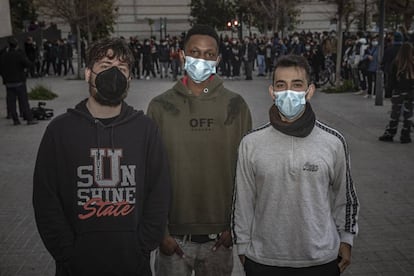Weekend of street protests that started over arrest of Spanish rapper sees looting of stores
Groups of youngsters stole goods from businesses and also vandalized buildings in Barcelona on Saturday and Sunday nights. The detention of Pablo Hasél, one demonstrator said, ‘is just an excuse’ for the demonstrations

There was a sixth night of disturbances in Barcelona on Sunday night, after protests were originally sparked last week when the rapper Pablo Hasél was arrested so that he could serve a prison sentence for praising terrorism and insulting the Spanish Crown in messages on social media. The violent demonstrations have been seen in a number of cities across the country since Tuesday, and on Saturday night descended into the looting of stores in the Catalan capital.
On Sunday, small groups of protestors threw objects against a line of officers from the regional police force, the Mossos d’Esquadra, who were protecting a police precinct on Via Laietana street. Around a thousand people, according to the local police, took part in the disturbances. Seven arrests were made, while one mosso was left with minor injuries.
As had taken place the night before, a small group of protestors approached the Palau de la Música concert hall, located close to the police precinct. One individual, however, managed to dissuade the crowd from attacking the building. The Mossos advanced and pushed the crowds north, to Catalunya square, where they dispersed.
This had the effect, however, of allowing some of the groups to once again enter stores to loot the goods inside, as had happened the night before.
Hasél was detained last week after a court had refused to suspend his nine-month sentence due to his criminal record, which includes convictions for assault and for writing songs that expressed admiration for terrorist acts. Catalan police arrested him on Tuesday after he refused to report to prison in Lleida.
The arrest sparked protests across Catalonia on Tuesday, which later spread to Madrid and Valencia. While the demonstrations began in support of freedom of speech, the ensuing clashes with police, in which a 19-year-old woman lost an eye, have also turned into a call against police repression.
The fifth night of the disturbances, on Saturday night, saw not only looting in stores located on the Portal de l’Àngel and Paseo de Gràcia streets, but also attacks on the aforementioned Palau de la Música and the Bolsa de Barcelona stock exchange. Rocks and other objects were also thrown at officers. Around 6,000 people took part in the protests, according to municipal police.
Late on Saturday night, the regional interior minister, Miquel Sàmper, complained that what had begun on Tuesday as a protest for “the right to freedom of expression” had descended into “acts of pure vandalism and pillaging in stores.” Most of those arrested, he added, were common criminals with prior arrests for theft and who had joined the protests with “purely criminal intent.”
The Paseo de Gràcia Association, which brings together 180 businesses on the street, estimated that “several million” euros worth of damage was done during the riots on Saturday night, which they blamed on the “irresponsibility” of a number of political groups.
Despite the damage, locals in Barcelona agreed that the disturbances were not as serious as they were in 2019, after pro-independence leaders were jailed by the Supreme Court for their role in the 2017 secessionist drive in the Catalonia region. “The demonstrators don’t do anything in general, the problem is the satellite groups who act separately and also you have to take into account how the police act,” explained Núria and Francesc, 55 and 59, who were walking close to the Plaza de Catalunya at the weekend when they spoke to this newspaper. “There’s a lot of unhappiness and inequality. Youngsters don’t have work and they need to be heard.”

EL PAÍS also spoke to several of the youngsters involved in the demonstrations to find out why they had come out onto the streets. “There’s a lot of rage and an accumulation of injustices and problems that youngsters are facing, but that have spread to the rest of society,” said Alex Cantón, 24, in Valencia. “We cannot enter the labor market or we have very precarious jobs, although I don’t think that this is an easy thing to do for a 50-year-old either,” added the youngster, who earns money as a food-delivery rider for Just Eat.
“We came to the protest, but Hasél is just another excuse,” explained Laura, 40, just before the demonstration in Barcelona on Friday. “We are protesting against evictions, in defense of people without protection, for the years of repression that we have supported. The jailing [of Hasél] was just the straw that broke the camel’s back.”
Based on reporting by Alfonso L. Congostrina, Jesús García, Bernat Coll and Ferran Bono.
English version by Simon Hunter.
Tu suscripción se está usando en otro dispositivo
¿Quieres añadir otro usuario a tu suscripción?
Si continúas leyendo en este dispositivo, no se podrá leer en el otro.
FlechaTu suscripción se está usando en otro dispositivo y solo puedes acceder a EL PAÍS desde un dispositivo a la vez.
Si quieres compartir tu cuenta, cambia tu suscripción a la modalidad Premium, así podrás añadir otro usuario. Cada uno accederá con su propia cuenta de email, lo que os permitirá personalizar vuestra experiencia en EL PAÍS.
¿Tienes una suscripción de empresa? Accede aquí para contratar más cuentas.
En el caso de no saber quién está usando tu cuenta, te recomendamos cambiar tu contraseña aquí.
Si decides continuar compartiendo tu cuenta, este mensaje se mostrará en tu dispositivo y en el de la otra persona que está usando tu cuenta de forma indefinida, afectando a tu experiencia de lectura. Puedes consultar aquí los términos y condiciones de la suscripción digital.








































